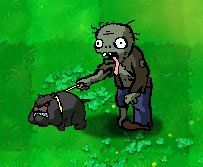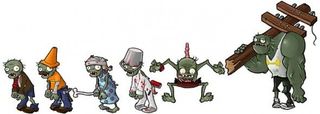George Fan and his cat on the making of Plants vs. Zombies
PC Gamer: Were there any paths you started down but that didn't work out?
George Fan: There was a point when I was inspired by Magic: the Gathering. I was teaching my girlfriend how to play it, and [the game] was at a stage where it was already Plants vs Zombies. It was a five lane defence game, and I had this ambition to incorporate some of the elements that I found really cool from Magic: The Gathering.
The idea was that you would custom build your deck of plants, and one plant would be randomly selected off the top of the deck and would roll down this conveyor belt. Every ten to twenty seconds a plant would come down, so instead of having all your plants to choose from, or six or seven of your plants, you would only have what was given to you by the random selection of one card off the top.
The idea was that you would customise what your deck would look like, in a simplified way. We never got too far with the first version of that. You would choose ten plants, so you could choose sunflower three times and peashooter seven times, and so that would equal 70% peashooter and 30% sunflower. I had these ideas later because in Magic: the Gathering I like the draft format. I think it's a lot of fun, and I had these ideas of incorporating some sort of draft where you might face off versus a computer opponent somehow and pick cards that would go into your plant deck.
It was ambitious, but it ended up being-- it took people at PopCap to say, "This is on the side of too complicated." I realised, yeah, I was trying to bring this mechanic into a company that was PopCap. I think it could have been done, but it would have been a big fight to reign in on the game mechanics.

PC Gamer: Was it too complicated for the game, or was it too complicated for PopCap and their ethos?
George Fan: I think it was more the first than the second. I think it would have ended up being something that I didn't want for the game, too. I really dislike games when I play them and I have to do a lot of work to understand what's going on. I like games that put it all in front of me, and I try to apply that whenever I make a game. Just because it's been done one way before doesn't mean there's not a simpler, more understandable way to do something. Whenever I could in Plants vs. Zombies I tried to look for that but I think it was a good decision to not pursue that direction.
PC Gamer Newsletter
Sign up to get the best content of the week, and great gaming deals, as picked by the editors.
PC Gamer: Do you work in the San Francisco office or do you work from your home?
George Fan: We have an office pretty close to San Francisco that I do go into and work there. Right now it's just me and a programmer, the one for Plants vs Zombies. He's a very talented programmer and it's just us two right now. There were plans to grow the studio out more originally, but instead the studio actually shrunk, so it's just us now.
It's kind of ended up feeling like something in between what I was doing before, in between working independently and working for a company. I appreciate that, it's a nice balance to get. I think it'd be nice to get another team in here that was working on a game so that we could test out their games and they could test out our games, and I think we'd have this nice symbiotic situation. PopCap's pretty hands-off. We're working on something new now and PopCap's letting us do it, and not really getting their hands in too much.
PC Gamer: Plants vs Zombies, and I heard this from PopCap people, seems to skew a little more hardcore than PopCap's usual audience. Was there ever a resistance to that side of the game, trying to make it more simple when you were getting feedback from the other PopCap guys?
George Fan: There was a little bit of trepidation in terms of-- I think it was more that it was a new, untested game concept. The original operating budget for Plants vs. Zombies was really, really, really, really small compared to other games that came out at the time, like Bejeweled Blitz for instance. I think there was a little bit of cautiousness on PopCap's behalf. Not so much that it was hardcore, but it was an untested concept and while people internally really love the game, there was still a bit of uncertainty about how well it would do.
The game ended up doing a lot. The game ended up having this crossover appeal more than being a real casual hit that PopCap games traditionally succeed in. I never felt like they changed anything in the game because PopCap deemed it too hardcore. I think every decision that was made was something that I would want to see in a game anyway. I think I was designing it for an audience of everyone, and just making a game I would want to make myself. I never felt like I had to make a decision that I wouldn't have wanted to put in the game or take from the game.

PC Gamer: Another early name for the game was Lawn of the Dead. I was told that you produced a video to send to George A. Romero, the creator of Night of the Living Dead, to try to convince him to let you use the name. What did that video contain?
George Fan: It had me dressed up as a zombie, and I was a zombie programmer. So I was trying to compile the code, and it would be me grunting and subtitles of, "Oh, there's a runtime error in line 437" or something like that. It was pretty much just a quick glance into what the game looks like, and me saying, "Please let us use the name." And we sent that over to him, and I don't even know for sure if George Romero watched it, but we got a response from him that they didn't want to let us use the name.
From that point on we knew we had to find a new name, which was an incredibly trying ordeal. In the end, it was kind of poetic I guess, as we ended up going with the first prototype name I had.
PC Gamer: As someone who has worked for both a hardcore and a casual games developer - at the same time, no less - what are the differences you see between the industries?
George Fan: I worked at two companies that let people take as long as they want to make their games. That was the connection, I think. In terms of casual or hardcore, I think the key is just that casual games require fewer people to produce, and that's something you don't find as much in the hardcore industry. Game teams are at least 30 or 40 large, and I think being a small team lets you experiment more.
I don't think I'd be satisfied making games that everyone has played before. I think my job is to try to come up with new experiences for people to play. It's nice to be on a small, agile team that has the freedom of making more unique games. I think it's a lot like what I was doing before, which was like the indie games community, and that's where a lot of the most bold ideas are coming from these days.
PC Gamer: PopCap seem to believe in traditional game design more than a lot of the other casual developers I've met. You guys trust your designers and iterate a lot, while everyone else seems to use player metrics and statistics.
George Fan: Oh yeah. Are you referring to social games, how they'll just try to fire and adjust mentality?

PC Gamer: Whereas PopCap seem to be steadfastly refusing to go down that line, even when doing things like Bejeweled Blitz and Zuma Blitz on Facebook.
George Fan: Yeah, I'm definitely on the side of PopCap in terms of that I think. I think when you do these metrics, they're helpful, but I don't think you can rely on them. They tell you what might sell in a game. A lot of times they'll use the metrics and they'll keep the game mechanics that help them do the best business, rather than the game mechanics that create the most fun experience.
That was kind of a bit of a wake up call for me, too. I realised that where as before I was equally striving to make games that were fun and addictive, I guess I think in this day and age I really want to focus on: if I make a game and someone says that it's fun, then I've succeeded, I think. I think you lose that in a lot of the game design by metrics, you lose the fun. It might retain its addictiveness because it's an activity that for some reason resonates with your brain, that keeps you wanting to play, but if you're not having a good time playing I don't think we should be designing games just to mindlessly make people want to play it over and over.
I think that the reason people want to keep playing should be that they're having a good time doing so. I think that's the slope you go down as you start designing by metric. You might lose what is actually, truly fun about videogames.
PC Gamer: What's next for you?
George Fan: I have a completely new game world and game genre that I am building right now. I don't think that I can say anything about it except that this is something new. But it's what I love doing; I love exploring new territory and I think the theme with all my games so far is taking a more hardcore game concept, like an RTS, and not so much making it casual, but stripping it down to something that can be enjoyed by everyone. The game I'm working on right now is kind of along the same lines. It takes elements from more hardcore genres and tries to boil them down to what the essence of them are, and retain all the funness, and not adding unnecessary complication.
PC Gamer: Can you tell me what genre it is?
George Fan: (laughs) Let's see. I don't know. It's actually a few different ones. I don't know if I can say that, I don't know if PopCap will let me. Yeah, I think I'll just stay on the side of caution.
PC Gamer: Say hello to your cat for me.
[Continue to page three for a ton more concept art and super high-res zombies]
Most Popular





